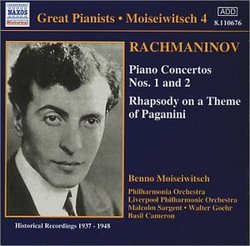| All Artists: Benno Moiseiwitsch, Malcolm Sargent, Philharmonia Orchestra, Liverpool Philharmonic Orchestra Title: Rachmaninov: Piano Concertos Nos. 1 and 2, Rhapsody on a Theme of Paganini Members Wishing: 0 Total Copies: 0 Label: Naxos Original Release Date: 1/1/1937 Re-Release Date: 2/12/2002 Genre: Classical Styles: Chamber Music, Forms & Genres, Concertos, Historical Periods, Classical (c.1770-1830), Modern, 20th, & 21st Century, Instruments, Keyboard Number of Discs: 1 SwapaCD Credits: 1 UPC: 636943167625 |
Search - Benno Moiseiwitsch, Malcolm Sargent, Philharmonia Orchestra :: Rachmaninov: Piano Concertos Nos. 1 and 2, Rhapsody on a Theme of Paganini
 | Benno Moiseiwitsch, Malcolm Sargent, Philharmonia Orchestra Rachmaninov: Piano Concertos Nos. 1 and 2, Rhapsody on a Theme of Paganini Genre: Classical
|
Larger Image |
CD Details |
CD ReviewsThrilling Rachmaninov! J Scott Morrison | Middlebury VT, USA | 02/13/2004 (5 out of 5 stars) "I am absolutely astounded that no one has reviewed this extraordinary release before now. It contains some of the most thrilling playing of Rachmaninov I've ever heard. It matters not that the sound is a bit dated. Transfer engineer Ward Marston has taken care of that; he has provided what are truly outstanding sonics for even the oldest recordings here, the Second Piano Concerto and the Rhapsody on a Theme of Paganini, both recorded in 1937.
I have come more and more to treasure the recordings made by Benno Moiseiwitsch (1890-1963), and Naxos is doing a wonderful service by releasing newly transferred versions of many of his recordings. They have now released at least six CDs that I'm aware of and I'm slowly acquiring them all. He had, until recent months, been only a name to me, but I can unequivocally state to you that he is one of the most elegant, musical and clean-playing pianists I've ever encountered. All that, and he had personality, too. Rachmaninov highly praised his playing of his music, even when his recordings competed with Rachmaninov's own. This 1937 recording of the Second Concerto competed head to head with Rachy's own and consequently didn't have as much notice as it might have. But it deserves its current distribution, and dare I say it, I prefer it to Rachy's own - should I be hanging my head in shame? - and the equal of my sentimental favorite, Rubinstein/Reiner/Chicago. (Those super-fast staccato right-hand octave triplets in scherzando section of the first movement are the cleanest and most electrifying I've ever heard.) As for the Rhapsody, it is without question the most thrilling I've ever heard. He takes it faster than usual in the earlier variations and this makes the piece take on a sparkle I've never encountered before. And when he comes to the popular 18th variation his cantabile is the equal of any great singer. Then listen to the impressive lightness of touch in Variation 21. Quicksilver. He is not let down in the accompaniment by the London Philharmonic under Basil Cameron (a usually merely serviceable conductor who, here, breathes with his soloist). Finally, a few words about the First Concerto recording. It was made in late 1948, at the very end of the 78 rpm era (indeed, Columbia had already just come out with long-playing records). It was never issued on LP and thus was virtually lost. Ward Marston, however, had made a tape from a well-preserved set of test pressings and this transfer is made from that tape. And thank goodness for that. I have no idea why the First Concerto isn't played more often. It is, in my estimation, the equal of the much more popular Second and Third, but obviously my opinion doesn't get it played on concert programs. I've only heard it live once in fifty years of concert-going. Okay, perhaps it is more like Tchaikovsky than the later concerti, but is that so bad? Moiseiwitsch plays it as the showpiece it is. As for the patented Rachmaninov 'big tunes,' they're all here. Malcolm Sargent conducts the Philharmonia Orchestra and although there are some sour patches (the playing? the recording? I don't know) the accompaniment is generally fine. More to the point, though, is the sensitive and yet bravura playing of Moiseiwitsch. Listen, for instance, to the embroidery the piano provides at the second appearance of the first movement's big tune in the orchestra. The second movement swoons, just as it should, with left-hand patterns that prefigure those in the Third Concerto. The third movement is, of course, a barn-burner with glinting right-hand runs and ten-finger chords that take one's breath away. Frankly, Moisewitsch manages these as brilliantly as Ashkenazy or Byron Janis in their celebrated recordings. Strongly recommended for those who are interested in fabulous playing and not bothered by dated sonics (and they're actually quite good for their time, thanks to engineer Marston). TT=78:12 Scott Morrison" |

 Track Listings (6) - Disc #1
Track Listings (6) - Disc #1